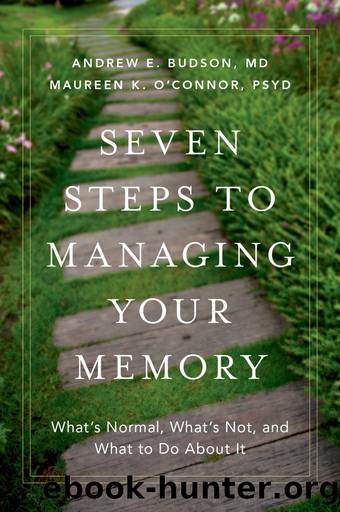Seven Steps to Managing Your Memory by Andrew E. Budson MD

Author:Andrew E. Budson MD
Language: eng
Format: epub
Publisher: Oxford University Press
Published: 2017-10-15T00:00:00+00:00
CHOLINESTERASE INHIBITORS âTURN BACK THE CLOCKâ ON MEMORY LOSS
âThe medication that I am going to prescribe is called donepezil. You might have heard of it by its brand name, Aricept. Although itâs approved for those with Alzheimerâs disease dementia, in my experience it works quite well in those with mild cognitive impairment due to Alzheimerâs disease.â
âHow does it work?â Sara asks.
âIt works by stopping the breakdown of a chemical in the brain called acetylcholine.â
âThis medication will improve my memory?â asks Jack.
âYes. Most people experience an improvement in their memory equivalent to âturning back the clockâ on their memory problems six to twelve months.â
âYou mean my memory will be like it was half a year or a year ago?â asks Jack.
âYes, most likely. There are some people, perhaps a quarter, for whom it has a smaller effect or no effect. But most people see an improvement.â
âHow long will it work?â asks Sara.
âIt typically works as long as one keeps taking it,â explains the doctor. âBut it is important to note that although it can âturn back the clock,â it cannot stop the clock from ticking down.â
âBecause it is not disease modifying?â asks Sara.
âYes, exactly. Your memory will still get worse over time,â she says, looking at Jack, âbecause the medication cannot stop the Alzheimerâs disease from progressing. But your thinking and memory will always be better on the medication than off of it.â
âWhat happens if I stop taking it?â Jack asks.
âYour memory would decline in about two weeks the amount that it would normally decline in six to twelve months.â
âIâll keep taking it thenâI donât want that to happen!â Jack responds.
âWhat are the side effects?â Sara asks.
âMost people do fine on this medication without any side effects, but maybe one in ten people experience an upset stomach and have loss of appetite, nausea, loose stools, or rarely vomiting. About one in fifteen people will have vivid dreams at nightânot necessarily nightmares, but whatever dreams they typically have can seem very real. Maybe one in thirty people will develop a runny nose, increased saliva, or muscle aches. And maybe one in a thousand people will experience a slowing of the heart rate.â
âHow will we know if Dad has a slowing of his heart?â asks Sara.
âHe might feel lightheaded, like he might faint, or he could actually faint. If either of those symptoms happens you should call the office or 911 right away. Weâll take his pulse to get his heart rate now, and we will take it again when heâs been on the medication for a while. Weâll get an EKG as well, just to be safe. Any other questions about this medication?â
Jack shakes his head.
âOK, good. Iâm starting you on 5 milligrams a day for one month followed by 10 milligrams after that. Starting slow will give your body a chance to get used to the medication and reduce the likelihood of side effects. Iâd like to see you back in two to three months to see how you are doing on the medication.
Download
This site does not store any files on its server. We only index and link to content provided by other sites. Please contact the content providers to delete copyright contents if any and email us, we'll remove relevant links or contents immediately.
L Equipe NP by 22793(897)
Application of a Novel Technique for Clinical Evaluation of Nitric Oxide-Induced Free Radical Reactions in ICU Patients by Unknown(740)
Rosenâs Emergency Medicine Concepts and Clinical Practice by Ron Walls; Robert Hockberger; Marianne Gausche-Hill; Timothy B. Erickson; Susan R. Wilcox(607)
Constructing Canine Consent; Conceptualising and Adopting a Consent-focused Relationship with Dogs by ERIN JONES(472)
Oxidative damage to surfactant protein D in pulmonary diseases by Vitality Starosta1 & Matthias Griese1†(448)
Social Science Perspectives on Global Public Health by Vincent La Placa & Julia Morgan(418)
Chassin's Operative Strategy in General Surgery: An Expositive Atlas by Carol E. H. Scott-Conner Andreas M. Kaiser Ninh T. Nguyen Umut Sarpel Sonia L. Sugg(411)
ADVANCED EMERGENCY CARE AND TRANSPORTATION OF THE SICK AND INJURED by Unknown(358)
Irwin and Rippeâs Intensive Care Medicine by Unknown(356)
Organic Chemistry: An Acid - Base Approach by MICHAEL SMITH(341)
Diagnostic and Statistical Manual of Mental Disorders, Fifth Edition, Text Revision (DSM-5-TR(tm)) by Unknown(323)
Access to Medicines and Vaccines in the South : Coherence of Rules and Policies Applied by the European Union Commission by Stephen Kingah(313)
Saunders Nursing Drug Handbook 2024 - E-Book by Unknown(307)
Human Microanatomy; Cell Tissue and Organ Histology with Celebrity Medical Histories by Stephen A. Stricker(292)
Information Technology for Education, Science, and Technics by Unknown(292)
Davis's Comprehensive Manual of Laboratory and Diagnostic Tests with Nursing Implications by Unknown(291)
Socio-Life Science and the COVID-19 Outbreak : Public Health and Public Policy by Makoto Yano; Fumihiko Matsuda; Anavaj Sakuntabhai; Shigeru Hirota(284)
Berne and Levy Physiology E-Book by Unknown(271)
Replacing the Dead by Mie Nakachi;(267)
